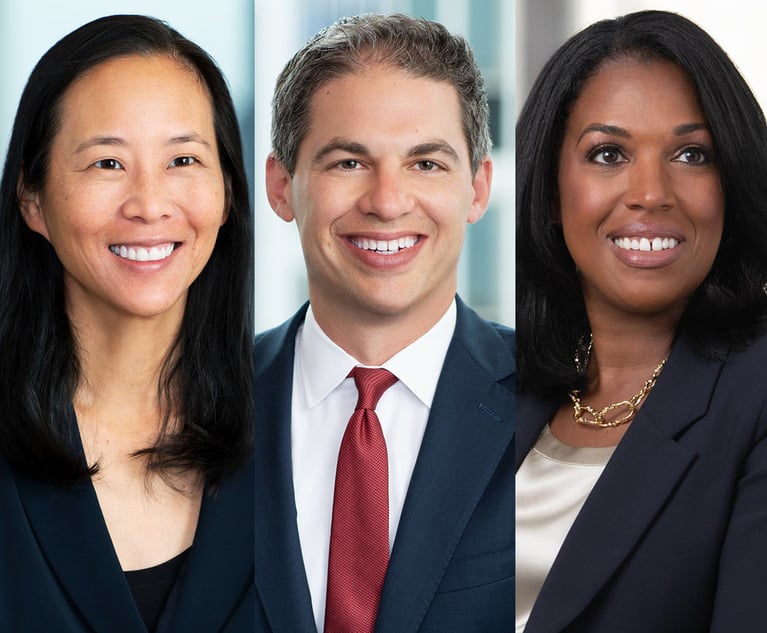Freshfields' former Manchester pioneer on moving to DWF and 're-engineering' law firms
Anup Kollanethu on becoming DWF's new CEO of managed services
August 15, 2018 at 05:52 AM
6 minute read
The original version of this story was published on Law.com
When he joined Freshfield Bruckhaus Deringer in 2015, Anup Kollanethu had 12 years' experience building shared services in the insurance world, but was a legal sector novice. He now arrives at DWF as a comparative veteran, after spearheading one of the UK's largest legal services offerings for the magic circle firm.
Making the switch to DWF earlier this month, Kollanethu has become the firm's new CEO of managed services – a role that will see him oversee the development and growth of DWF's volume and integrated legal services work. Expectations are high.
"The expertise that Anup brings to this role will allow us to create a sustainable platform for future growth, and he will play a key part in how we provide integrated services to clients globally," says DWF managing partner and CEO Andrew Leaitherland.
He adds: "We're looking to create a division which brings together our complex, managed and connected services. Anup allows us to do that. He's a great addition for us and it's great timing too. We're both matched in terms of our approach to legal services as not just a traditional business."
When it comes to building integrated services, Kollanethu is an old hand. In 2015, Freshfields recruited him from Aviva Investors, where he was managing director of global shared services.
At that time, after 12 years at Aviva, Kollanethu was an insurance man through and through. But the legal sector presented business challenges too enticing to ignore and Kollanethu joined Freshfields – charged with establishing and running its then fledgling legal services centre in Manchester.
Under his leadership, the centre has grown into a 700-strong operation, managing much of the firm's process-led tasks, including document reviews, due diligence and verification work.
It's about re-engineering how a business can adapt and evolve
"I hadn't spent long in the legal industry but I was fascinated by it at Freshfields," he says of his move.
"It's an industry on the cusp of significant change. For law firms, it's about re-engineering how a business can adapt and evolve, and thinking about how they can move away from the traditional construct of service delivery."
Freshfields' centre in Manchester is just one of a plethora of low-cost 'managed services' centres that have been opened by law firms across the country in the past few years.
Firms such as Clifford Chance, Hogan Lovells, Bryan Cave Leighton Paisner and Herbert Smith Freehills have all looked to improve efficiency by opening centres outside of London, rerouting much of their process-led, IT-driven volume work.
"Every firm has its own strategy," says Kollanethu. "We established the legal services centre at Freshfields because clients wanted this model. You hear a lot about new law, big law, law tech, innovation – firms are starting to step over the traditional model and we're seeing more integrated managed services.
"The premise is to add everything together, build scale into it and deliver it as one package. A more complete service to get the whole thing done."
Speaking about his reasons for leaving Freshfields, he says: "I joined Freshfields to set up and establish the global centre and in three years we delivered everything we set out to deliver, even slightly ahead of plan. Then I wanted to think about what to do next, given where the industry was going. For me, that was the trigger for the move."
Happily, for Kollanethu and DWF, "everything just clicked right into place" with his new firm.
"It was appropriately placed given its strategy, and it was unlike a typical law firm in terms of what it's capable of doing – namely, bringing together insurance, complex law and connected services businesses with legal services," he says.
There is a client demand for a shift away from the traditional construct of legal services and a need to stay nimble and agile
"Most firms are thinking about how to adapt and I think DWF is an absolutely fantastic platform for doing things in a much more holistic manner," adds Kollanethu.
"Both I and DWF understand that there is a client demand for a shift away from the traditional construct of legal services and a need to stay nimble and agile. The question for us was how we can create a platform that provides a credible, integrated service that engages the client and asks them what they would like to see more of – and shaping our services from that perspective."
Kollanethu stresses that his hire is just the latest part of DWF's "growth agenda" – an agenda that has led the firm to mull an initial public offering on the London Stock Exchange, which would be the largest UK law firm listing to date.
"In DWF, you're looking at a firm with growth over five or six years. And now the aim is to go back to clients with a more integrated development model. This has been driven by conversations with existing clients – how much more value can we give you? How much more can we scale up?"
He concedes the challenge at DWF will be very different to that at Freshfields.
"The challenge is to find the right solution for the firm, rather than just replicating your peers or bigger firms. And here [at DWF], it's about shifting the language away from things like 'centres'. There is what I call a 'tension point', and for me that means bringing clients to the core of the conversation.
"It is always a question of where the industry is shifting to, and differentiating yourself. And DWF was always up for that challenge."
This content has been archived. It is available through our partners, LexisNexis® and Bloomberg Law.
To view this content, please continue to their sites.
Not a Lexis Subscriber?
Subscribe Now
Not a Bloomberg Law Subscriber?
Subscribe Now
NOT FOR REPRINT
© 2025 ALM Global, LLC, All Rights Reserved. Request academic re-use from www.copyright.com. All other uses, submit a request to [email protected]. For more information visit Asset & Logo Licensing.
You Might Like
View All

Meet the Long Island Judge Tapped to Be US Attorney for Eastern District of New York
3 minute read
Appeals Court Rejects Trump Attempt to Delay Friday Sentencing
Trending Stories
- 1Western NY Justice Agrees to Public Admonishment Over 'Obvious' Conflict of Interest
- 2How to Litigate Before the EU’s Top Court, the European Court of Justice
- 3After Solving Problems for Presidents, Ron Klain Now Applying Legal Prowess to Helping Airbnb Overturn NYC Ban
- 4Attorneys Allege Contract Broken for Sharing $13M in Fees From MDL
- 5ZwillGen Acquires Lawyers, Scientists and Technology from Luminos.Law, Developer of Luminos.AI Platform
Who Got The Work
Michael G. Bongiorno, Andrew Scott Dulberg and Elizabeth E. Driscoll from Wilmer Cutler Pickering Hale and Dorr have stepped in to represent Symbotic Inc., an A.I.-enabled technology platform that focuses on increasing supply chain efficiency, and other defendants in a pending shareholder derivative lawsuit. The case, filed Oct. 2 in Massachusetts District Court by the Brown Law Firm on behalf of Stephen Austen, accuses certain officers and directors of misleading investors in regard to Symbotic's potential for margin growth by failing to disclose that the company was not equipped to timely deploy its systems or manage expenses through project delays. The case, assigned to U.S. District Judge Nathaniel M. Gorton, is 1:24-cv-12522, Austen v. Cohen et al.
Who Got The Work
Edmund Polubinski and Marie Killmond of Davis Polk & Wardwell have entered appearances for data platform software development company MongoDB and other defendants in a pending shareholder derivative lawsuit. The action, filed Oct. 7 in New York Southern District Court by the Brown Law Firm, accuses the company's directors and/or officers of falsely expressing confidence in the company’s restructuring of its sales incentive plan and downplaying the severity of decreases in its upfront commitments. The case is 1:24-cv-07594, Roy v. Ittycheria et al.
Who Got The Work
Amy O. Bruchs and Kurt F. Ellison of Michael Best & Friedrich have entered appearances for Epic Systems Corp. in a pending employment discrimination lawsuit. The suit was filed Sept. 7 in Wisconsin Western District Court by Levine Eisberner LLC and Siri & Glimstad on behalf of a project manager who claims that he was wrongfully terminated after applying for a religious exemption to the defendant's COVID-19 vaccine mandate. The case, assigned to U.S. Magistrate Judge Anita Marie Boor, is 3:24-cv-00630, Secker, Nathan v. Epic Systems Corporation.
Who Got The Work
David X. Sullivan, Thomas J. Finn and Gregory A. Hall from McCarter & English have entered appearances for Sunrun Installation Services in a pending civil rights lawsuit. The complaint was filed Sept. 4 in Connecticut District Court by attorney Robert M. Berke on behalf of former employee George Edward Steins, who was arrested and charged with employing an unregistered home improvement salesperson. The complaint alleges that had Sunrun informed the Connecticut Department of Consumer Protection that the plaintiff's employment had ended in 2017 and that he no longer held Sunrun's home improvement contractor license, he would not have been hit with charges, which were dismissed in May 2024. The case, assigned to U.S. District Judge Jeffrey A. Meyer, is 3:24-cv-01423, Steins v. Sunrun, Inc. et al.
Who Got The Work
Greenberg Traurig shareholder Joshua L. Raskin has entered an appearance for boohoo.com UK Ltd. in a pending patent infringement lawsuit. The suit, filed Sept. 3 in Texas Eastern District Court by Rozier Hardt McDonough on behalf of Alto Dynamics, asserts five patents related to an online shopping platform. The case, assigned to U.S. District Judge Rodney Gilstrap, is 2:24-cv-00719, Alto Dynamics, LLC v. boohoo.com UK Limited.
Featured Firms
Law Offices of Gary Martin Hays & Associates, P.C.
(470) 294-1674
Law Offices of Mark E. Salomone
(857) 444-6468
Smith & Hassler
(713) 739-1250










